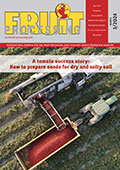Over 30 international journalists from 20 countries attended the Geisenheim Conference on Climate Change
A Media Summit with a strong international attendance took place in Geisenheim on November 21, 2019. The Summit featured the publication of the third ProWein Business Report on the special topic of climate change, prepared by Hochschule Geisenheim University. Over 30 journalists from 20 countries attended nine presentations by international speakers on the effects of climate change on the wine industry, as well as adaptation and sustainability strategies. Two Geisenheim professors Prof. Dr. Hans Reiner Schultz and Prof. Dr. Claudia Kammann kicked things off by addressing the causes and existential significance of climate change for humankind.
In a live stream from Australia, Prof. Dr. Markus Herderich and Dr. Mardi Longbottom from the Australian Wine Research Institute (AWRI) reported on the impact of climate change on Australia’s wine industry, the adaptation strategies that have been in place there since 1980, as well as Australia’s sustainable wine-growing program. The presentation of the ProWein Business Reports on Climate Change by Prof. Dr. Simone Loose was streamed as a webinar to journalists worldwide. In underlining the significance of the report, Loose said: “this is the first time the ProWein Business Report has quantified the extent to which the various players in the international wine industry have already been affected by climate change, the comprehensive measures that have been taken to respond to it, as well as those that will be necessary in the future.”
Dr. Cristina Carlos from the Association for the Development of Viticulture in the Douro Region (ADVID) gave a very vivid account of the extent to which the winegrowers in Portugal are already suffering from water shortages and heat stress and the adjustments that are currently being made in order to sustain winegrowing in the region. Dr. Lukas Egarter Vigl of EURAC Research in Bolzano gave a talk on the systematic shift by South Tyrolean winegrowers to higher and cooler vineyards. Dr. Hervé Hannin from INRA Montpellier said France is thus far the only country to have systematically discussed local strategies for adapting to climate change with its winegrowers, which it intends to transform into a national strategy. The ecological sustainability of the wine industry was the focus of the two concluding lectures. Marcus Ihre from Systembolaget explained the role sustainability standards play in the purchasing of wines by the Swedish state-run retailer monopoly for alcoholic beverages,and how these standards are set and monitored. Keith Ulrich highlighted the fact that Fair’n Green is the only German standard in the wine industry to date to encourage members to make continuous improvements in all three areas of sustainability. As a member of Fair’n Green, winegrower Jochen Schmidt from the Palatinate region spoke about the measures he has successfully taken to make his winery CO² neutral.
The three-day Media Summit was rounded off by a tasting of sustainable wines presented by Stuart Piggott and Paula Sidore in the Geisenheim wine cellar, a tour of the Geisenheim FACE facility, a dinner at Schloss Vollrads, a demonstration of steep-slope viticulture in the Assmannshausen domain and a visit to the Steinberg cellar.









